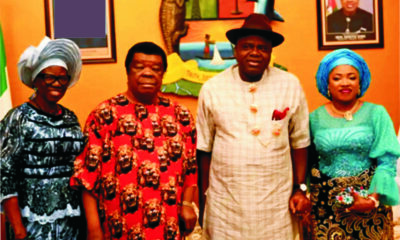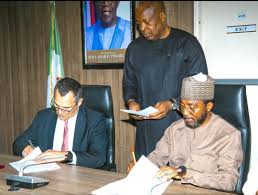News
Group Flays Bayelsa’s 2012 Budget Performance
A Non-Governmental Organisation has taken a retrospective view at the performance of the Bayelsa State budget for last year and cautioned the officials of the state government to take steps to correct lapses when implementing the 2013 budget.
Briefing journalists in Yenagoa, the Executive Director of African Leadership, Strategy and Development Centre (LSD), Dr Otive Igbuzor expressed worries that the level of recurrent expenditure including the over head cost in relation to personnel cost in the state increased from 40 percent in 2011 to 49 percent in 2012.
‘’A state with grossly inadequate social amenities and a high level of poverty evidenced by poor health and high child mortality rate inluding high levels of unemployment; should have more of the budget expenditure directed to capital projects’’
Dr Igbuzor who was represented at the press briefing by the Programme Officer of the Organisation, Mr Monday Osasah remarked that while the capital allocations may to some extent have reflected state agenda and MDGs priorities, it is important to ensure proportionality between allocations to personnel and overhead too.
The organisation remarked that in terms of actual implementation of the budget in 2012, its field officers discovered that in all sites visited non-release of fund for project execution was inherent, except in Ministry of Agriculture and Natural Resources where the sum N10 million was released for farmers’ data and Works where the sum of N7 billion was release for the dualisation of Azikoro, Sani Abacha Express, and Edepie/Tombia roads.
Igbuzor also noted that “repetitions of line items with same amounts abound in almost every MDA in the state which shows lack of transparency and weak legislative oversight function both at the enactment/approval and monitoring/evaluaion stages of the budget proces; the state budget still follows the incremental budgeting approach instead of zero budgeting; as a result there is lack of linkage betgween the state budget and the state policy at the general and sectoral levels’’.
The Centre LSD director recommended that in order to make the 2013 budget different, government should partner with Civil Society Organisations to undertake needs assessment that will feed into both LGAs and State budgets, carry out periodic monitoring exercise to assess level of implementation by MDAs, while relevant information should also be made available to citizens for easy tracking of projects.
They also advocate for enhanced efficiency in public expenditure management by strenghtening the capacuty of government institutions such as the Budget Office while the State Assembly should be further built to enable them carry out effective oversights functions.
Expressing gratitude to the state government for giving them opportunity to carry out the project of budget monitoring, the organisation further recommended that economic diversification should be emphasised through the development of the agro-allied processing, manufacturing and other non-oil sectors as to achieve a broader based employment generating and wealth creation economy.
News
FG Targets Production Of Locally Made Vehicles By Dec
The Minister of Industry, Trade and Investment, Dr Doris Uzoka-Anite, has affirmed that Nigeria now has the capacity and materials to manufacture Made-In-Nigeria cars for local use and export.
With the enabling environment being provided by the government, she said manufacturers should be held responsible if the cars are not rolling out by December 2024.
Currently, Nigeria produces less than 10 per cent of the vehicles used in the country.
Last year, Nigeria’s vehicle assembling industry, estimated to be worth around N302billion, tanked to a new low due to increasing production costs and weakened demand for locally assembled automobiles.
According to the Manufacturers CEOs Confidence Index, activities of motor vehicles and miscellaneous assembly deteriorated further below the benchmark (50 points) from 48.6 to 46.7 points.
But speaking at the Automotive Component Manufacturers meeting in Abuja, she noted that the automobile industry is faced with both challenges and opportunities.
A statement issued last Friday by the Director of Information and Public Relations, Adebayo Thomas, said, “In a significant move aimed at fostering sustainable growth and development in Nigeria’s automobile industry, the Federal Government has issued a clarion call to all stakeholders, including manufacturers, dealers, regulatory bodies, and other players in the automobile ecosystem.
“The call comes as part of a broader strategy to enhance the sector’s contribution to the nation’s economy.”
Encouraging the stakeholders to key into the Nigerian Automotive Development Policy, the Minister said, “As far as we are concerned, the auto industry is now set to go.
“We are counting on all stakeholders to make that happen. If we do not produce made-in-Nigeria cars before the end of this year (December), it will be your fault, because I am sitting down here giving you all the assurances that this administration has created the enabling environment to make sure that the auto policy kicks off.”
Anite emphasised the need for collaboration among manufacturers, dealers, regulatory bodies, and other players in the automobile ecosystem, saying by working together, they can address challenges, streamline processes, and drive innovation.
She also urged stakeholders to maintain high-quality standards across the board, including vehicle manufacturing, safety features, emissions control, and after-sales services.
Stringent adherence to quality, she said, will boost consumer confidence and attract investment.
The minister assured all that the government would continue to encourage increased investment in research and development, adding that, innovations in electric vehicles, fuel efficiency, and alternative energy sources are critical for long-term sustainability.
On local content, she also emphasised the importance of promoting local content by sourcing materials and components locally.
By doing this, she said, the sector can create jobs, reduce import dependency, and contribute to economic diversification
In his introductory comments, the ministry’s Permanent Secretary, Nura Rimi, emphasised the significance of team action and shared vision as outlined in the Nigerian Automotive Development Policy.
He also urged stakeholders that the country “will overcome obstacles and unleash the full potential of Nigeria’s automotive component sector.”
He encouraged NADDC and other stakeholders to use the chance to form alliances, explore new areas of collaboration, and devise ways to catapult the automotive components manufacturing industry to new heights of success.
The statement added, “The government’s charge underscores the pivotal role stakeholders play in shaping its trajectory. Their commitment to sustainable practices will drive Nigeria’s automotive sector towards a brighter and more prosperous future.
“Environmental Responsibility: Stakeholders are reminded of their environmental responsibilities. Sustainable practices, recycling, and eco-friendly manufacturing processes are essential for a greener future.”
News
Waive Tax On Electronic Imports, Women Engineers Appeal To Tinubu
The Association of Professional Women Engineers of Nigeria (APWEN), Lagos Chapter, has called on President Bola Tinubu to exempt the importation of electronic components from taxation for inventive engineers.
Chairman of APWEN, Ms Atinuke Owolabi, said this a in statement yesterday in Lagos, in commenration of the 2024 World Creativity and Innovation Day, with the theme: “Step Out and Innovate”.
The Tide source reports that World Creativity and Innovation Day is a global UN Day, celebrated on April 21, to raise awareness about the importance of creativity and innovation in problem solving.
This is with respect to advancing the United Nations’ sustainable development goals, also known as the global goal.
Owolabi explained that such a measure would significantly enhance technological progress, support local innovators, and elevate Nigeria as a leading hub for innovation globally.
She stated that in a world marked by dynamic challenges and unprecedented opportunities, creativity and innovation stand as the driving forces behind progress and transformation.
According to her, women engineers recognise the critical role that innovation plays in shaping our societies and driving sustainable development.
”On this occasion, we affirm our commitment to fostering a culture of creativity and innovation within our organisation and the broader engineering community.
”Together, let us step out, innovate, and inspire the next generation of women engineers to reach even greater heights of achievement and impact.
”We believe that by stepping out of our comfort zones and embracing new ideas, technologies, and approaches, we can unlock innovative solutions to the complex challenges facing our world today,” she said.
According to her, the theme: ‘step out and innovate’, serves as a call to action for women engineers everywhere to break barriers, challenge conventions.
She noted that it would also pioneer groundbreaking solutions that would propel them toward a brighter and more sustainable future.
Owolabi disclosed that in celebration of the World Creativity Day, APWEN Lagos had inaugurated an artificial intelligence club tailored for female engineering students and young engineers.
She said that the proactive initiative aimed to inspire and equip young engineers with cutting-edge technological insights.
Th chairman said, “Additionally, we already have a 200-capacity hall to set up a resource, technology, and innovation hub to empower women and girls in engineering.
”This endeavour serves as a catalyst for encouraging aspiring female engineers to embrace innovation and stay abreast of emerging trends in the field.
”APWEN Lagos stands united in its dedication to promoting diversity, inclusivity, and excellence in engineering.
“We encourage all female engineers to seize this opportunity to unleash their creativity, explore new frontiers, and make an indelible mark on the world.”
News
Pan-Igbo Group Hails Dangote Group For Reducing Diesel Price
A pan-Igbo group, Ndigbo Unity Forum (NUF), has commended the Chairman of the Dangote Group, Alhaji Aliko Dangote, and his management for reducing the price of diesel from N1,600 to N,1000 per litre.
The Tide’s source reports that diesel is the major fuel used by heavy duty vehicles and generating sets to transport goods as well as run industries across the country.
The President of NUF, Mr Augustine Chukwudum, told The Tide’s source in Enugu, yesterday, that Dangote’s timely response to suffering masses of Nigerians, going through hell to get a meal a day, “is highly commendable”.
According to Chukwudum, Nigerians need to appreciate the patriotism of Dangote since what he has done will go a long way in reducing prices of goods, especially food stuff which has gone out of the reach of the poor.
He called on Nigerians, who wish and pray always for the betterment of the country, to appreciate and thank God for answering their prayer through Dangote’s move.
“It is clear that if Dangote Refinery starts fully and gets all the crude oil needed from Nigeria, the prices of petrol, kerosene and diesel will further reduce.
“We commend President Bola Tinubu for being a listening President and supporting the Dangote Group on our crude oil needs.
“We appeal to Tinubu to encourage Dangote by providing the company with crude oil at a reduced rate as we have been demanding,” he said.
Chukwudum said that this move and subsequent further reduction, would bring industries in comatose back to life, jobs created for unemployed youths and reduction in crime as well.
“We call on governors of oil-producing Anambra, Imo and Abia States to bring investors, who shall build refineries in each of the states to refine thousands of barrels of crude in commercial quantities,” he said.
-
Opinion1 day ago
Agriculture: Solution To Hunger, Inflation, Food Insecurity
-
News1 day ago
Pan-Igbo Group Hails Dangote Group For Reducing Diesel Price
-
Sports1 day ago
Minister Renews Hope For Sports Dev, Signs MoU
-

 Rivers1 day ago
Rivers1 day agoBayelsa LG Polls: BYSIEC Issues Return Certificates To Chairmen, Others
-

 Maritime1 day ago
Maritime1 day agoNPA Secures $700m Citibank Loan For Tin Can, Apapa Ports Rehabilitation
-

 News1 day ago
News1 day agoJAMB Sanctions Officials For Asking Candidate To Remove Hijab
-

 Opinion1 day ago
Opinion1 day agoCautious Optimism As Naira Rebounds
-
News1 day ago
Waive Tax On Electronic Imports, Women Engineers Appeal To Tinubu

